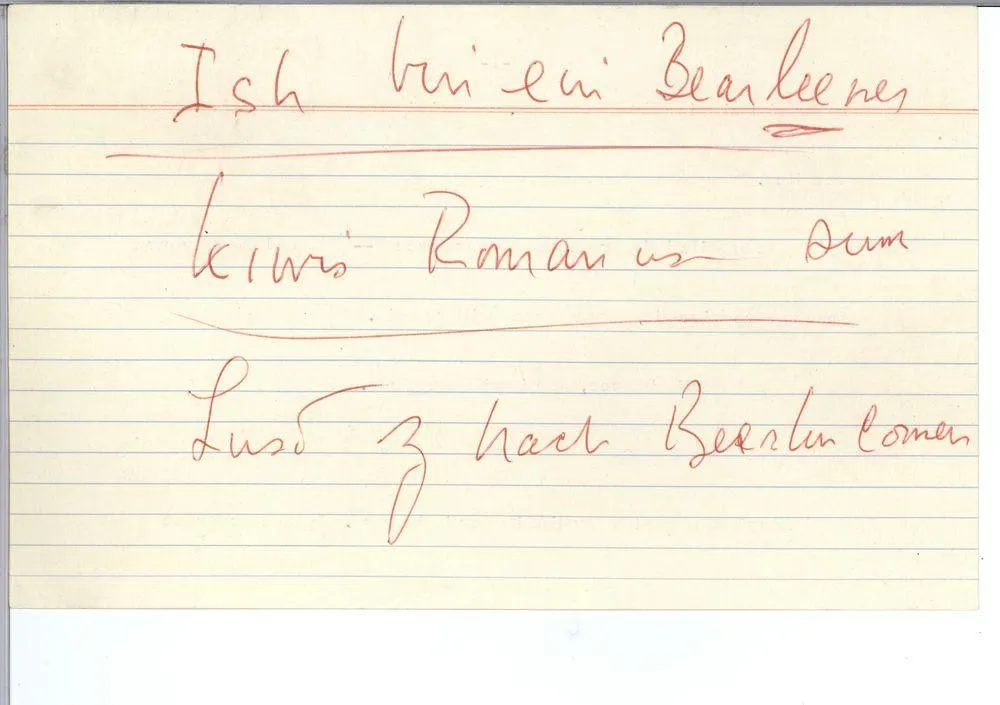Where the Myth of JFK’s ‘Jelly Donut’ Mistake Came From
The misinterpretation didn’t arise until years after his death
/https://tf-cmsv2-smithsonianmag-media.s3.amazonaws.com/filer/d9/74/d974ac53-9b53-4ea9-9006-e2f19f58167b/jfk.jpg)
Yes, President John Fitzgerald Kennedy stood by the Wall in West Berlin on this day in 1963 and delivered a speech that included the line Ich bin ein Berliner. No, he never said anything about donuts.
Though Kennedy was “notoriously tongue-tied when it came to foreign languages,” writes Thomas Putnam for The Atlantic, he understood perfectly what he was saying during a state visit to West Berlin. His interpreter, a native German speaker, had given him the line in an era-making speech. Unfortunately, that speech is remembered for an imagined slip of the tongue.
It was an almost-unscripted moment in American rhetoric. Originally, Kennedy had been given a speech for the occasion, but Putnam writes that he felt it was wishy-washy and conciliatory to the Soviets. Though the Cold War was peaking and West Berlin–held up as a “beacon of hope” amidst Soviet-controlled East Germany–was a potential flashpoint, he decided to add his own touches to the prepared speech.
In the end, the speech Kennedy delivered departed from his written script in three-quarters of its lines, according to German professor Jürgen Eichhoff. The line that he was supposed to deliver was “So let me ask you… to lift your eyes beyond the danger of today to the hopes of tomorrow–beyond the freedom of this city of Berlin to the advance of freedom everywhere–beyond the Wall to the day of peace with justice–beyond yourselves to all mankind.”
Instead, he chose to translate a theme of global democracy in a more direct way, writes Putnam, hearkening back to Roman democracy. His words: “Two thousand years ago, the proudest boast was ‘Civis Romanus sum [I am a Roman citizen].’ Today, in the world of freedom, the proudest boast is ‘Ich bin ein Berliner.’”
He returned to the statement to end the speech: “All free men, wherever they may live, are citizens of Berlin, and therefore, as a free man, I take pride in the words Ich bin ein Berliner.”

Nobody laughed when he said this, as The New York Times would erroneously report twenty-five years later. “The situation was too tense for the Berliners to be amused,” Eichhoff wrote in his 1993 takedown of the incident. “What is more… ‘Ich bin ein Berliner’ is not only correct but the one and only correct way of expressing in German what the President intended to say,” he wrote.
While it is true that a Berliner is a word for jelly donut, it's not a term that was used in the area surrounding Berlin, which preferred the word Pfannkucken.
The misconception might have originations in a 1983 spy novel. “The day after President Kennedy made his famous proclamation, Berlin cartoonists had a field day with talking donuts,” one character says. (They didn’t. It didn't happen. Fake news.)
But it got its first big exposure in 1988, Eichhoff wrote. First, a letter-writer to Newsweek cited the story in the January issue. Then in April, a 75-year-old editorial writer named William J. Miller picked it up and ran with it in the Times. His article was headlined "I Am a Jelly-Filled Doughnut." The urban legend has persisted since.
Rather than voicing general platitudes about the good of democracy and its potential impact on the world, Kennedy chose to take an aggressive stance in a city that had been violently divided by the Cold War. He delivered a masterful piece of rhetoric that's remembered today in the name of the square where he delivered the speech, which has been renamed John F. Kennedy Platz.